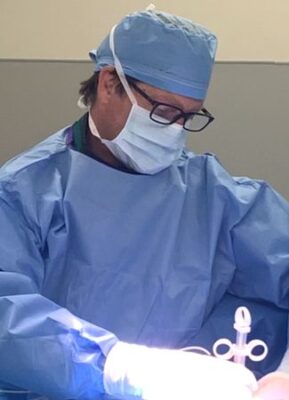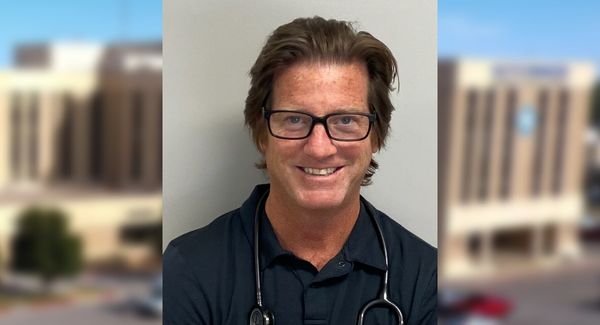Working with patients on a more holistic level and having the ability to focus on a single patient’s care and outcome is what led Brian Fleeman ‘03 to a career as a certified registered nurse anesthetist (CRNA).
In October 2022, he was named president of the 900-member Kansas Association of Nurse Anesthetists (KANA).
Fleeman started his career path with a bachelor’s degree in nursing from Wichita State University, after which he worked at Wesley Medical Center in the intensive care unit (ICU). Four years into that job, Fleeman discovered Newman University’s Master of Nurse Anesthesia (MNA) program.
After earning his MNA, he moved on to Ascension Via Christi St. Francis, where he was in an anesthetist group for about two-and-a-half years before working at Galicia Heart Hospital for nine years. He eventually moved to Hutchinson, Kansas, for a job opportunity and in 2018, started his own business, Salt City Anesthesia. His group provides anesthesia services to Hutchinson Regional Medical Center and Hutchinson Clinic.
Fleeman completed his Doctorate of Nursing Practice in 2021 from Texas Wesleyan University, a program that focused on business management, something which he has been able to put into practical use for his own business.
Reflecting on Newman
As a Wichita resident, Newman University made the most sense for Fleeman to attend. He knew the two-year anesthetist program would be more convenient and a good match for the education he was looking for.
While in the program, Fleeman knew he’d made the right choice just based on his clinical experience.
“The diversity of clinical experience was huge at Newman,” said Fleeman. “I was especially lucky because at the time, open heart surgery was performed on a more regular basis. I was able to assist in more than 90 open heart surgery anesthetic cases.”
The diversity of clinical experience was huge at Newman. I was able to assist in more than 90 open heart surgery anesthetic cases.
Brian Fleeman ‘03
Fleeman said Ascension Via Christi St. Francis and Wesley Medical Center were two of the biggest sites offering clinicals, but he was exposed to various surgery centers and gained experience in outpatient surgeries and cardiac cases as well.
Pharmacology adjunct professor Dave Moran was influential in Fleeman’s education at Newman.
“I audited his course because he is so knowledgeable about physiology and pharmacology,” said Fleeman. “He knows medicines inside-out and is a great teacher of the field. In fact, when I worked with him at Wesley ICU, I told him Newman was looking for professors. I’m very grateful I was able to take his course there.”
Focusing on patient care
As an ICU nurse, Fleeman didn’t have plans to go into anesthesia. But he found a passion for working with patients through their complete diagnosis and recovery.
“When you have chronic pain, you’re probably going to deal with that for a long time, the rest of your life,” he explained. “What I’m doing now, I really get to know my patients. Even though we’re a large rural hospital, it’s very much of a community here in Hutchinson. And it really comes down to relationships — following and helping a patient from beginning to end.”

Fleeman works with all types of anesthesia care, from general anesthesia in the surgical unit to local anesthesia such as epidural shots. He also enjoys personalizing patient treatment plans, which could include recommending physical therapy or strategizing good sleep hygiene with individuals.
“It goes beyond the injection. I want to help the patient in their daily lives and in the long term.”
Navigating COVID-19
The roles of CRNAs changed quite significantly with the onset of the COVID-19 pandemic. Fleeman said this was the first time health care wasn’t recession-resistant. Surgery centers were being shut down and elective surgeries were canceled and no longer prioritized.
“Some CRNAs were being furloughed from their jobs,” said Fleeman. “The case volume wasn’t high enough to provide jobs.
“Fortunately, because CRNAs practice at a high level, we were able to transition some of those services back to the ICU. All CRNAs are ICU-trained nurses prior to their anesthetist schooling and we were able to pick up the slack there and help with ICU functions that we learned during our training. We were placing breathing tubes, central lines and arterial lines in some of the sickest patients.”
Even though there was a big shift of job duties, emergent or inpatient surgery was still a necessity, so CRNAs were still needed in many situations.
Fleeman said Hutchinson Medical Center had just completed a brand new, state-of-the-art ICU in 2018. Little did they know that an international pandemic was just around the corner, resulting in such a high demand for the facility.
“We were accepting patients from multiple states away. I’m very proud of what we had built and felt blessed to offer such great care to so many patients.”
Even as the pandemic is slowing down and fewer patients are needing COVID care, Fleeman is still providing health care to post-COVID and long COVID patients by using a stellate ganglion block to help patients get their senses of taste and smell back.
“This block has been around treating PTSD and other diagnoses. It’s like the ‘GFCI reset’ button for our bodies. Your nervous system responds to everything … so this can reset your system. Even if COVID only partially affected someone’s smell — for instance, cilantro, cheese and wine begin tasting putrid — this injection can help them.”
Setting goals
Fleeman’s nearly 27-year career in health care has provided him with certain goals and passions that he will continue pursuing.
He has been a KANA board member since 2016 as the political action chairperson. During his one-year term as KANA’s president, he hopes to accomplish two main goals: update the current practice act and advocate for the veto of the Kansas bill that would enact the anesthesiologist assistant licensure act.
Fleeman believes this legislatution would dramatically affect training programs statewide and possibly cause the state to suffer, losing CRNAs and reducing access to anesthesia services in the process.
“My biggest goal is to update our practice act that was originally written in 1986,” he explained. “There have been addendums along the way, but it has never been completely updated. So much has changed since then, so it needs a major update. Doing that will be more in line with what we do now, increasing the number of providers and reflecting what we can and should be doing in our field.”
During the year, he will also be working with the association to grow several committees and to build stepping stones to committee members who are interested in becoming a board member.
After fulfilling his presidency term, Fleeman will serve as vice president the next year.
“Being named KANA president is a great honor and a great responsibility,” Fleeman said. “The first 15 years of my career in anesthesia I was happy to leave it to others to worry about the direction of the association. That all changed sometime around 2017 when legislative issues impacting the nurse anesthesia profession motivated me to step up my involvement in KANA. My passion for my profession and professional organization has only gotten stronger in the years since.”
Apply to the Doctor of Nurse Anesthesia Practice Program at Newman
The DNAP program is multifaceted and addresses health care needs and problems of the city, region, and nation through anesthesia education. It prepares qualified individuals to assume advanced practice nursing roles in the delivery of safe and evidence-based anesthesia care.


